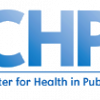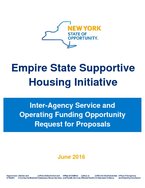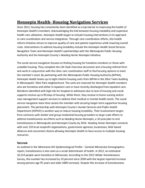0
Webinar
Community:
Sep 12, 2023
This webinar will describe new research that shows children whose families participated in a program that helped them move from distressed neighborhoods to areas with lower rates of poverty experienced significant improvements in severe asthma episodes. Before moving, for every 100 children, there were approximately 88 severe asthma attacks per year. After moving, there were approximately 40 severe attacks per year, a reduction of more than 50%. The webinar will explore factors that help explain these changes in asthma, including the critical role of neighborhood-related stress, and describes future direction and pilot programs.
The publication can be found in the Journal of the American Medical Association here: https://jamanetwork.com/journals/jama/article-abstract/2804823
Authored by: Housing Is Working Group, Johns Hopkins University researchers
Topics: Asthma, Healthy homes, Housing, Mental health, Mobility
 Shared by Camille Anoll-Hunter
Shared by Camille Anoll-Hunter
Camille Anoll-Hunter posted a
on Sep 13, 2023
Housing Is Working Group, Johns Hopkins University researchers
This webinar will describe new research that shows children whose families participated in a program that helped them move from distressed neighborhoods to areas with lower rates of poverty experienced significant improvements in severe asthma episodes.
0
Webinar
Community:
Aug 8, 2023
Building and maintaining effective community partnerships is a critical component of health center management and community involvement. Local partners help integrate important stakeholders into organizational processes and empower health centers to better understand and care for the communities they serve. But can health centers design and evaluate their partnerships? In this webinar, we reviewed tools and procedures for designing, evaluating, and strengthening community partnerships with a focus on pragmatic, practical and innovative solutions.
Authored by: National Center of Health In Public Housing
Topics: Health, Housing, Partnerships
 Shared by Camille Anoll-Hunter
Shared by Camille Anoll-Hunter
Camille Anoll-Hunter posted a
on Aug 8, 2023
National Center of Health In Public Housing
Building and maintaining effective community partnerships is a critical component of health center management and community involvement.
0
Case study
Community:
Feb 9, 2023
The following are case studies of NYCHA energy efficiency decarbonization programs. More information about the New York City Housing Authority (NYCHA) various sustainability programs can be found in our Sustainability Agenda.
Authored by: NYCHA and CLPHA
Topics: Energy, Environmental Resiliency/Climate Change, Housing, Sustainability
 Shared by Sandra Ware
Shared by Sandra Ware
Sandra Ware posted a
on Feb 9, 2023
The following are case studies of NYCHA energy efficiency decarbonization programs. More information about the New York City Housing Authority (NYCHA) various sustainability programs can be found in our Sustainability Agenda.
0
Case study
Community:
Nov 29, 2022
Many older LGBTQ+/SGL people who pioneered coming out of the closet are now forced to go back
in. As their housing needs and preferences change with age, prejudice is still rampant. And under the
U.S. Fair Housing Act, gender identity and sexual orientation are not explicitly protected classes where
housing is concerned. Creating appropriate housing for LGBTQ+/SGL seniors must be informed by the
life experiences of older people in this community, which often include family rejection, mistreatment,
and even violence. This means increasing our cultural competence—from the terminology used, to the
design and management of housing developments that consider past traumas. This case study presents
innovative housing projects as well as guidance for developers on how to meet some of the unique
needs of this particular population.
Authored by: Stephanie Firestone and Julia Glassman for AARP Equity by Design- Principles in Action
Topics: Community development, Housing, Seniors
 Shared by Sandra Ware
Shared by Sandra Ware
Sandra Ware posted a
on Nov 29, 2022
Stephanie Firestone and Julia Glassman for AARP Equity by Design- Principles in Action
Many older LGBTQ+/SGL people who pioneered coming out of the closet are now forced to go back
in. As their housing needs and preferences change with age, prejudice is still rampant. And under the
U.S.
0
Case study
Community:
Oct 25, 2022
According to UN-Habitat, the world needs to build 96,000 affordable homes every day to address the
global housing crisis by 2030. Yet, better utilizing existing housing stock—through options such as shared
housing—can make a significant dent in the need to build more housing. With college students often
challenged to find affordable housing and many older adults living alone in homes with spare bedrooms,
these two groups are increasingly benefitting from living together. Universities are often well-suited to
facilitate students living and learning with older adults in nearby communities. Intentionally fostering
intergenerational engagement through places and programs can reduce loneliness, mitigate ageist
stereotypes, and help both groups to thrive.
Authored by: Stephanie Firestone and Julia Glassman for AARP Equity by Design
Topics: Community development, dual-generation initiative, Funding, Health, Homelessness, Housing, Mental health, Seniors, Youth
 Shared by Sandra Ware
Shared by Sandra Ware
Sandra Ware posted a
on Oct 25, 2022
Stephanie Firestone and Julia Glassman for AARP Equity by Design
According to UN-Habitat, the world needs to build 96,000 affordable homes every day to address the
global housing crisis by 2030. Yet, better utilizing existing housing stock—through options such as shared
housing—can make a significant dent in the need to build more housing.
0
Case study
Community:
Aug 1, 2022
Created by the Older Americans Act in 1973, AAAs are part of the national Aging Network. AAAs are the local leaders that develop, coordinate, and deliver a wide range of home and community-based services. These services include information and referral/assistance, case management, home-delivered meals and meals in
congregate settings, in-home services, caregiver supports, transportation, evidence based health and wellness programs, long-term care ombudsman programs, and more. People who receive services provided by AAAs have improved health and well-being, helping them remain in their homes and thrive in the community.
Authored by: U.S Administration for Community Living
Topics: Disabilities, Food insecurity, Homelessness, Housing, Low-income, Seniors, Supportive housing
 Shared by Sandra Ware
Shared by Sandra Ware
Sandra Ware posted a
on Oct 18, 2022
U.S Administration for Community Living
Created by the Older Americans Act in 1973, AAAs are part of the national Aging Network. AAAs are the local leaders that develop, coordinate, and deliver a wide range of home and community-based services.
0
Case study
Community:
Aug 1, 2022
As an Area Agency on Aging (AAA), AgeSpan engages in innovative partnerships with housing providers through the Massachusetts Supportive Housing Program (MSHP). Working with property managers at designated local housing sites, AgeSpan places staff as resident service coordinators (RSCs). The RSCs deliberately build strong, trusting relationships with residents, offering a daily touchstone that greatly improves quality of life. When housing and services are coordinated, older adults and people with disabilities are
better able to live well in the community.
Authored by: U.S administration for Community Living
Topics: Disabilities, Food insecurity, Housing, Low-income, Seniors
 Shared by Sandra Ware
Shared by Sandra Ware
Sandra Ware posted a
on Oct 18, 2022
U.S administration for Community Living
As an Area Agency on Aging (AAA), AgeSpan engages in innovative partnerships with housing providers through the Massachusetts Supportive Housing Program (MSHP). Working with property managers at designated local housing sites, AgeSpan places staff as resident service coordinators (RSCs).
0
Webinar
Community:
Dec 14, 2021
At its December 2021 meeting, CLPHA's Housing Is Working Group learned from experts in the field about how they have worked to create resident-focused and community-centered work with their PHAs and partners. We also brainstormed how best to support residents and work towards more equitable and representative housing for everyone, and left with the knowledge of how to better highlight and prioritize resident voices and leadership at every level of our work.
Authored by: Housing Is
Topics: Family engagement, Health, Healthy homes, Housing, Housing Is Working Group, Mental health, Racial inequalities, Supportive housing
 Shared by Stephanie Gray
Shared by Stephanie Gray
Stephanie Gray posted a
on Apr 18, 2022
At its December 2021 meeting, CLPHA's Housing Is Working Group learned from experts in the field about how they have worked to create resident-focused and community-centered work with their PHAs and partners.
0
Webinar
Community:
Jun 11, 2019
CLPHA’s Education Working Group convened on Tuesday, June 11 to learn about one of the Housing Authority of Kansas City’s (HAKC) newest housing communities: Pemberton Park, a subsidized apartment building that serves grandparents caring for grandchildren. Representatives from HAKC and their partners discussed the process of establishing the grand-family complex, as well as challenges and successes they experienced along the way.
Authored by: CLPHA, Housing Is
Topics: Education, Family engagement, Housing, Housing Is Working Group, Low-income, Partnerships, Seniors, Youth
 Shared by Housing Is
Shared by Housing Is
Housing Is posted a
on Jun 11, 2019
CLPHA’s Education Working Group convened on Tuesday, June 11 to learn about one of the Housing Authority of Kansas City’s (HAKC) newest housing communities: Pemberton Park, a subsidized apartment building that serves grandparents caring for grandchildren.
0
Webinar
Community:
Apr 10, 2019
Advocacy is everyone's job and it is essential to the children and communities we serve. CLPHA’s Education Working Group hosted a webinar to learn about advocacy efforts to build support and investment in housing. Representatives from Partnership for Children and Youth (PCY) – a California-based advocacy organization that promotes and supports learning opportunities for underserved students – discussed strategies for providing, sustaining, and increasing access to Out-of-School-Time services in housing. PCY also touched on a range of advocacy strategies and preliminary results from the Save After School Campaign in California.
Authored by: CLPHA
Topics: CLPHA, Education, Housing, Housing Is Working Group, Legislation & Policy, Out-of-school time, Partnerships, Youth
 Shared by Housing Is
Shared by Housing Is
Housing Is posted a
on Apr 10, 2019
Advocacy is everyone's job and it is essential to the children and communities we serve. CLPHA’s Education Working Group hosted a webinar to learn about advocacy efforts to build support and investment in housing.
0
Case study
Community:
This is a summary of HealthInfoNet’s (HIN) recommendations to pursue the integration of Maine’s Homeless Information Management System (HMIS) with Maine’s statewide Health
Information Exchange (HIE).
Authored by: HealthInfoNet and Data Across Sectors for Health (DASH)
Topics: Data sharing, East Coast, Health, Homelessness, Housing, Partnerships
 Shared by Mica O'Brien
Shared by Mica O'Brien
Mica O'Brien posted a
on Feb 20, 2019
HealthInfoNet and Data Across Sectors for Health (DASH)
This is a summary of HealthInfoNet’s (HIN) recommendations to pursue the integration of Maine’s Homeless Information Management System (HMIS) with Maine’s statewide Health
Information Exchange (HIE).
0
Case study
Community:
In 2018, Penobscot Community Health Care (PCHC), a Federally Qualified Health Center and The Hope House Health and Living Center in Bangor began a unique collaboration between health care and homelessness services utilizing HealthInfoNet’s Analytics and Reporting Platform (HARP). This tool identifies patients at high-risk for readmissions and connecting them to appropriate community and health services to prevent readmissions.
Authored by: HealthInfoNet and Penobscot Community Health Care (PCHC)
Topics: East Coast, Health, Homelessness, Housing, Partnerships
 Shared by Mica O'Brien
Shared by Mica O'Brien
Mica O'Brien posted a
on Feb 20, 2019
HealthInfoNet and Penobscot Community Health Care (PCHC)
In 2018, Penobscot Community Health Care (PCHC), a Federally Qualified Health Center and The Hope House Health and Living Center in Bangor began a unique collaboration between health care and homelessness services utilizing HealthInfoNet’s Analytics and Reporting Platform (HARP).
0
Webinar
Community:
Feb 12, 2019
During CLPHA’s Education Working Group Webinar on addressing school attendance at PHAs, representatives from the King County Housing Authority and the national nonprofit Attendance Works presented on tools for addressing chronic absenteeism, as well as strategies for fostering a culture of attendance among residents.
Authored by: CLPHA, Housing Is
Topics: Attendance, CLPHA, Dual-generation, Education, Housing, Housing Is Working Group, Low-income, Metrics, Partnerships, Place-based
 Shared by Housing Is
Shared by Housing Is
Housing Is posted a
on Feb 12, 2019
During CLPHA’s Education Working Group Webinar on addressing school attendance at PHAs, representatives from the King County Housing Authority and the national nonprofit Attendance Works presented on tools for addressing chronic absenteeism, as well as strategies for fostering a culture of attendanc
0
Webinar
Community:
Jul 17, 2018
Featuring Ellen Childs, PhD, from Boston University School of Public Health and Vaughan Rees, PhD, from Harvard T.H. Chan School of Public Health.
Authored by: Building Success
Topics: Health, Housing, Legislation & Policy, Smoke-free
 Shared by Housing Is
Shared by Housing Is
Housing Is posted a
on Feb 4, 2019
Featuring Ellen Childs, PhD, from Boston University School of Public Health and Vaughan Rees, PhD, from Harvard T.H. Chan School of Public Health.
0
Webinar
Community:
Jan 15, 2019
NLIHC and other leaders of the Campaign for Housing and Community Development Funding (CHCDF) provided updates on the latest information and guidance on how advocates can engage lawmakers to help end the shutdown.
Authored by: Campaign for Housing and Community Development Funding (CHCDF)
Topics: Funding, Housing, Legislation & Policy
 Shared by Mica O'Brien
Shared by Mica O'Brien
Mica O'Brien posted a
on Jan 16, 2019
Campaign for Housing and Community Development Funding (CHCDF)
NLIHC and other leaders of the Campaign for Housing and Community Development Funding (CHCDF) provided updates on the latest information and guidance on how advocates can engage lawmakers to help end the shutdown.
0
Case study
Community:
Dec 6, 2018
The Denver Housing Authority (DHA) wins a 2017 Award of Excellence in Client and Resident Services for creating the Health Navigators (HN) program, which provides mental health education, resources, and doctor referrals.
Authored by: Ashanti Wright for Journal of Housing & Community Development
Topics: Disabilities, Health, Housing, Low-income, Medicaid / Medicare, Mental health, Partnerships, Place-based, Seniors
 Shared by Mica O'Brien
Shared by Mica O'Brien
Mica O'Brien posted a
on Dec 21, 2018
Ashanti Wright for Journal of Housing & Community Development
The Denver Housing Authority (DHA) wins a 2017 Award of Excellence in Client and Resident Services for creating the Health Navigators (HN) program, which provides mental health education, resources, and doctor referrals.
0
Webinar
Community:
Dec 17, 2018
Webinar slide deck that provides a brief overview of FUP, building blocks of successful FUP voucher implementation, facilitated panel on increasing impact and enhancing FUP operations, and other opportunities and resources.
Authored by: CSH: 1 Roof and CLPHA
Topics: Child welfare, CLPHA, Foster care, Funding, Housing, Legislation & Policy, Low-income, Partnerships, Preventative care, Safety, Supportive housing, Youth
 Shared by Mica O'Brien
Shared by Mica O'Brien
Mica O'Brien posted a
on Dec 18, 2018
Webinar slide deck that provides a brief overview of FUP, building blocks of successful FUP voucher implementation, facilitated panel on increasing impact and enhancing FUP operations, and other opportunities and resources.
0
Webinar
Community:
Dec 11, 2018
CLPHA’s Education Working Group hosts a webinar including presentations on efforts from the Chicago Housing Authority to work with residents on pursuing postsecondary opportunities, as well as an update from HUD’s Office of Policy Development & Research on data collection around tracking and increasing FAFSA utilization.
Authored by: CLPHA
Topics: CLPHA, Cost effectiveness, Data sharing, Education, Funding, Housing, Housing Is Working Group, Low-income, Metrics, Midwest, Post-secondary, Research, Stability, Youth
 Shared by Mica O'Brien
Shared by Mica O'Brien
Mica O'Brien posted a
on Dec 12, 2018
CLPHA’s Education Working Group hosts a webinar including presentations on efforts from the Chicago Housing Authority to work with residents on pursuing postsecondary opportunities, as well as an update from HUD’s Office of Policy Development & Research on data collection around tracking and inc
0
Case study
Community:
Oct 31, 2018
To encourage architects and planners to design built environments that promote physical activity, New York City offers an “active design” building incentive within the Leadership in Energy and Environmental Design (LEED) standards. The Centers for Disease Control and Prevention (CDC) recommends that adults ages 18 to 65 engage in 150 minutes of moderate-intensity physical activity (MPA) or 75 minutes of vigorous physical activity (VPA) per week to reduce risk of disease and promote a healthy lifestyle, but in 2011, only 20 percent of Americans met these goals. Active design interventions provide an easy way for residents to increase their activity and meet these goals. This study analyzed the impact of the new design incentive on the activity levels of affordable housing residents at the Arbor House, a 124-unit development in the South Bronx that received the LEED credit.
Authored by: How Housing Matters, Preventative Medicine Reports
Topics: East Coast, Exercise, Health, Housing, Low-income, Place-based, Preventative care, Research
 Shared by Mica O'Brien
Shared by Mica O'Brien
Mica O'Brien posted a
on Nov 1, 2018
How Housing Matters, Preventative Medicine Reports
To encourage architects and planners to design built environments that promote physical activity, New York City offers an “active design” building incentive within the Leadership in Energy and Environmental Design (LEED) standards.
0
Webinar
Community:
Aug 29, 2018
Half of public housing authorities (PHAs) are engaged in at least one health initiative, almost all in partnership with the health sector, according to a new report by the Council of Large Public Housing Authorities (CLPHA) and the Public and Affordable Housing Research Corporation (PAHRC).Health Starts at Home: A National Snapshot of Public Housing Authorities' Health Partnerships finds that PHAs are key players in addressing the intersection of housing and health and that deepening partnerships between PHAs and health providers can better serve residents' and communities’ health needs.
Stephen Lucas (CLPHA), Keely Stater (PAHRC), and Kelly McElwain (PAHRC) discuss health initiatives taking place at PHAs across the country and strategies for better serving communities with cross-sector partnerships.
Authored by: CLPHA
Topics: CLPHA, Dual-eligibles, Health, Housing, Low-income, Medicaid / Medicare, Mental health, Nutrition, Partnerships, Place-based, Preventative care, Research, Seniors
 Shared by Housing Is
Shared by Housing Is
Housing Is posted a
on Oct 11, 2018
Half of public housing authorities (PHAs) are engaged in at least one health initiative, almost all in partnership with the health sector, according to a new report by the Council of Large Public Housing Authorities (CLPHA) and the Public and Affordable Housing Research Corporation (PAHRC).Health St
0
Webinar
Community:
Oct 9, 2018
CLPHA’s Education Working Group hosts a webinar with Bright by Text, a texting platform that connects caregivers with tools for improving educational outcomes for children. Bright by Text’s President and Senior Program Manager share information about their partnerships with housing authorities and non-profit housing providers across the country, providing insight into the benefits of connecting with residents through technology. CLPHA members who work with Bright by Text outline their respective initiatives and discussed local program goals.
Authored by: CLPHA
Topics: Child welfare, CLPHA, Dual-generation, Early childhood, Family engagement, Health, Home visiting, Housing, Housing Is Working Group, Partnerships, Place-based, Preventative care, Safety, School-readiness
 Shared by Mica O'Brien
Shared by Mica O'Brien
Mica O'Brien posted a
on Oct 10, 2018
CLPHA’s Education Working Group hosts a webinar with Bright by Text, a texting platform that connects caregivers with tools for improving educational outcomes for children.
0
Case study
Community:
Jun 25, 2018
The King County Housing Authority (KCHA), in partnership with the Highline School District and the nonprofit social service organization Neighborhood House, launched the Student and Family Stability Initiative (SFSI) pilot program in 2013 to provide housing and employment supports to homeless and unstably housed families with children enrolled in Highline elementary schools. In 2016, KCHA contracted with the Urban Institute (Urban) to conduct a process and outcome evaluation of the program’s first three pilot years. This evaluation documents how SFSI works, who it serves, and how well it helps participants achieve housing stability. This report synthesizes findings from data collection conducted over approximately 10 months that included document review, interviews with SFSI stakeholders, and analysis of program and other relevant KCHA administrative data.
Authored by: Martha M. Galvez, Amanda Gold, and Sara McTarnaghan
Topics: Attendance, Dual-generation, Education, Family engagement, Housing, Low-income, Pacific Northwest, Partnerships, Place-based, Research, Stability, Workforce development, Youth
 Shared by Mica O'Brien
Shared by Mica O'Brien
Mica O'Brien posted a
on Sep 18, 2018
Martha M. Galvez, Amanda Gold, and Sara McTarnaghan
The King County Housing Authority (KCHA), in partnership with the Highline School District and the nonprofit social service organization Neighborhood House, launched the Student and Family Stability Initiative (SFSI) pilot program in 2013 to provide housing and employment supports to homeless and un
0
Case study
Community:
Aug 9, 2018
The Vita Health & Wellness District is a one-mile corridor in Stamford, Connecticut, that has positioned itself as a “health-themed neighborhood,” offering mixed-income housing, health care services, community farming, early childhood education programming, and supportive services to residents. Led by the city’s public housing authority Charter Oak Communities and Stamford Hospital, this collaboration of city agencies and community-based organizations has focused on building physical and social capacity in a distressed neighborhood, with an emphasis on leveraging collective investments to yield a positive impact on neighborhood health and well-being.
Authored by:
Topics: Community development, Education, Food insecurity, Funding, Health, Housing, Nutrition, Partnerships
 Shared by Housing Is
Shared by Housing Is
Housing Is posted a
on Aug 9, 2018
The Vita Health & Wellness District is a one-mile corridor in Stamford, Connecticut, that has positioned itself as a “health-themed neighborhood,” offering mixed-income housing, health care services, community farming, early childhood education programming, and supportive services to residents.
0
Case study
Community:
Jul 23, 2018
Time and again, taking a narrow view of health care has proven ineffective in producing meaningful change. Yet the current
thrust of health care reform remains firmly focused on traditional health care services. Reforms such as care coordination models and patient centered medical homes are necessary but insufficient for homeless populations with complex problems. Pairing such reforms with supportive housing is more likely to result in lasting health improvements and reduced costs.
Authored by:
Topics: Cost effectiveness, East Coast, Health, Homelessness, Housing, Legislation & Policy, Medicaid / Medicare, Place-based, Supportive housing
 Shared by Housing Is
Shared by Housing Is
Housing Is posted a
on Jul 23, 2018
Time and again, taking a narrow view of health care has proven ineffective in producing meaningful change. Yet the current
thrust of health care reform remains firmly focused on traditional health care services.
0
Case study
Community:
Jul 19, 2018
Acknowledging the link between housing instability and expensive health care utilization, Hennepin Health began to include housing interventions in its approach to care coordination and service integration. Through care coordination efforts, this health reform initiative strives to improve quality of care and patient experience while lowering overall costs. Interventions to address housing instability include the Hennepin Health Social Services Navigation Team and Hennepin Health’s partnerships with the Minneapolis Public Housing Authority and the Hennepin County’s Heading Home Hennepin initiative.
Authored by:
Topics: Health, Homelessness, Housing, Partnerships, Pre-natal, Research, Youth
 Shared by Housing Is
Shared by Housing Is
Housing Is posted a
on Jul 19, 2018
Acknowledging the link between housing instability and expensive health care utilization, Hennepin Health began to include housing interventions in its approach to care coordination and service integration.
 Shared by Camille Anoll-Hunter
on Sep 13, 2023
Shared by Camille Anoll-Hunter
on Sep 13, 2023

 Shared by Camille Anoll-Hunter
on Aug 8, 2023
Shared by Camille Anoll-Hunter
on Aug 8, 2023

 Shared by Sandra Ware
on Feb 9, 2023
Shared by Sandra Ware
on Feb 9, 2023

 Shared by Sandra Ware
on Nov 29, 2022
Shared by Sandra Ware
on Nov 29, 2022

 Shared by Sandra Ware
on Oct 25, 2022
Shared by Sandra Ware
on Oct 25, 2022
 Shared by Sandra Ware
on Oct 18, 2022
Shared by Sandra Ware
on Oct 18, 2022
 Shared by Sandra Ware
on Oct 18, 2022
Shared by Sandra Ware
on Oct 18, 2022
 Shared by Stephanie Gray
on Apr 18, 2022
Shared by Stephanie Gray
on Apr 18, 2022
 Shared by Housing Is
on Jun 11, 2019
Shared by Housing Is
on Jun 11, 2019
 Shared by Housing Is
on Apr 10, 2019
Shared by Housing Is
on Apr 10, 2019
 Shared by Housing Is
on Feb 12, 2019
Shared by Housing Is
on Feb 12, 2019
 Shared by Housing Is
on Feb 4, 2019
Shared by Housing Is
on Feb 4, 2019


 Shared by Housing Is
on Oct 11, 2018
Shared by Housing Is
on Oct 11, 2018
 Shared by Housing Is
on Aug 9, 2018
Shared by Housing Is
on Aug 9, 2018
 Shared by Housing Is
on Jul 23, 2018
Shared by Housing Is
on Jul 23, 2018
 Shared by Housing Is
on Jul 19, 2018
Shared by Housing Is
on Jul 19, 2018






